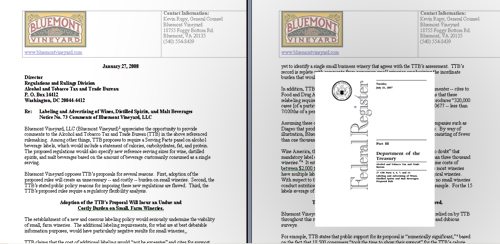
It is likely that all beer, wine and spirits labels will change dramatically in the near future. TTB has been working on new rules since CSPI and other groups submitted a petition in 2003. The new rules would require a “Serving Facts” panel on every container. This panel would include a lot more information, such as the typical serving size, number of servings per container, calories, carbohydrates, protein and fat. Because this is a big, controversial change, TTB has received more than 18,000 public comments during the past few years. There are far too many comments for most people to review, and so we will highlight and summarize the most noteworthy comments here. The most recent proposal and comments are here. This is comment 6 in a series; to see others, click on the “serving facts” tag below.
Bluemont’s General Counsel, Kevin Rupy, explains:
- Bluemont Vineyard is a small farm winery in Bluemont, Virginia. It was organized by two groups of brothers during the past few years.
- Bluemont opposes the rule as a costly, unnecessary burden on small wineries. The burden is so heavy it could “undermine the viability of small, farm wineries.”
- TTB claims the costs are not excessive, but Bluemont can’t identify a single small winery that agrees.
- The rule is “fantastic news for companies such as Diageo” because per-unit costs are much lower for companies with extremely high volumes. Diageo is a $3 billion a year company with more than 22,000 employees in 80 countries.
- TTB has more than 18,500 comments and claims this is “numerically significant” but it’s really a minuscule 0.02% of US wine consumers.
- Most of the comments stem from Diageo’s “Know Your Drink” campaign. It is an “astro turf campaign” orchestrated by a leading PR agency.
- Such “point and click,” web-based PR campaigns should not form the basis for major public policy decisions.
- CSPI’s consumer survey, showing wide support for the rule, fails to ask whether consumers are willing to pick up the increased costs that will result from the rule. It is an unfunded mandate.
- Because the rule will have a big impact on small business, the law requires TTB to prepare an initial regulatory flexibility analysis. TTB should balance the major costs against the small benefits.



Leave a Reply